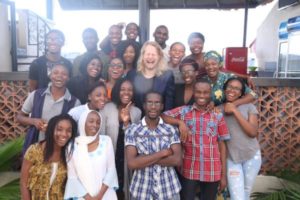This is how it starts out. Twenty-three strangers sitting around a conference room in silence, waiting for her.
It is after she walks in and sits down, alone and unencumbered by protocol, that everyone begins to let up. We slowly realise it is OK to breathe; we realise it is OK to be.
She takes each of  us apart, story by story. She tells us what is worth keeping and what can be improved. She teases us. She asks for opinions about a story, about any topic. Without saying so, she tells us that we can call ourselves writers, that our writing is good enough. She tells us to use details in unexpected ways, the way you might use a nail file to skin a cat. She never “teaches” us. Rather she gists. And in her gisting, she has taught us.
us apart, story by story. She tells us what is worth keeping and what can be improved. She teases us. She asks for opinions about a story, about any topic. Without saying so, she tells us that we can call ourselves writers, that our writing is good enough. She tells us to use details in unexpected ways, the way you might use a nail file to skin a cat. She never “teaches” us. Rather she gists. And in her gisting, she has taught us.
Slowly, like night flowering into day, I understand that it has stopped being about her and has become about other things, because this has never been about her.
It is about Chinaza Boy and the unassuming way he uses language to beautiful effect, how we sit in a Chicken Republic and talk about Chinua Achebe and the joys of reading, the way we rejoice in the mutual secret that we are both slow readers.
It is about Kunle and the way his beautiful, incendiary texts poke for trouble, and the way he pulls on my beard, testing my patience, and the way we laugh about it later. I know he wants to do it again and I will kill him if he tries.
It is about Ama and her enchanting voice, about the wisdom that appears to reside even in the sound of it, how she uses metaphor with startling originality.
It is about Fatima and the passion she exudes when she speaks and writes about justice and law, and how she manages to pull herself together and navigate this terrain of endless reading and writing even though she is smack in the middle of the holy month of Ramadan.
